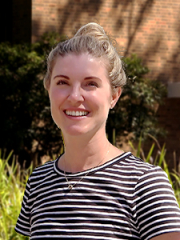Dr Constance Gomez-Poulin
BMed/ MD, Fellowship 2023 to 2024
I am incredibly grateful to have had the opportunity to develop clinical and academic skills in intellectual and developmental disabilities. This is an area that has traditionally been neglected within medical training and health services. This Fellowship is timely and aligns with recent recommendations from the Disability Royal Commission that have highlighted the need for improved education and training in intellectual disability health. I have benefited immensely from the expertise of the many people involved in my Fellowship. I'm confident that these skills will translate to better clinical care and advocacy for people with intellectual and developmental disabilities.
Training setting and experience
Dr Gomez-Poulin is completing her final year of specialist training as an advanced trainee in Forensic Psychiatry. Her interest in intellectual disabilities stems from her time in the forensic system, where people with intellectual and developmental disorders are both overrepresented and extremely vulnerable. Her Fellowship has spanned multiple different settings including the Department of Developmental Disability and Neuropsychiatry at UNSW, Prince of Wales Hospital, The Forensic Hospital, and the private sector.
Value to the sector and individual
People with intellectual and developmental disabilities are often physically, socially and psychologically complex, and require specialised services and expertise. Psychiatry training program does not traditionally provide specialised training in this area. As a result, many clinicians have limited experience and confidence in treating people with intellectual or developmental disabilities; and in turn, people with intellectual or developmental disabilities often find it difficult to access adequate care. The Fellowship provides experience in the assessment and holistic management of patients with intellectual and developmental disability, which will invariably translate into better patient care.
Dr Pramudie Gunaratne
MD BMed BA (Int Rel) MMed (Psychiatry) MSc (Pub Health) FRANZCP GAICD, Fellowship 2022 to 2023
This fellowship has been incredibly valuable in helping me develop clinical and academic skills within the field of intellectual disability neuropsychiatry. The experience has also provided great insights into the importance of advocacy and innovative service models when caring for people with complex needs that span the physical health, mental health and disability sectors. I am grateful for the wonderful guidance of supervisors and mentors involved in this fellowship experience and look forward to taking these skills forward into my ongoing work.
Training setting and experience
Dr Gunaratne’s fellowship experience spanned multiple settings including the Department of Developmental Disability and Neuropsychiatry at UNSW, Prince of Wales Hospital, Westmead Hospital and The Sydney Children’s Hospital Network Mental Health and Intellectual Disability (MHID) Hub. This provided experience working across the clinical and research spheres. It also provided an opportunity to understand the lifespan of care for people with intellectual disability from early childhood to adult care.
Value to the sector and individual
Australians with intellectual disability experience very high rates of mental ill-health and multiple barriers to effective care. This is associated with numerous poor outcomes, including higher rates of avoidable mortality, longer admissions, and increased re-presentations to inpatient psychiatric units and emergency departments. This fellowship provided a unique opportunity to develop specialised clinical, research and service development skills to help improve care for people with intellectual disability and mental health dual diagnoses.

